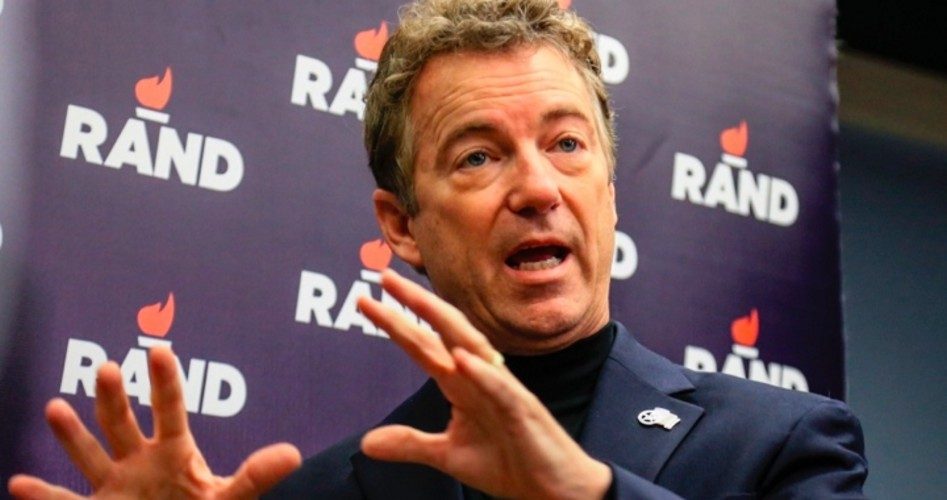
Shortly before Fox Business Network, the sponsor of the January 14 Republican presidential debates, announced on January 11 that Senator Rand Paul (R-Ky.) will not be included in the main primetime event to be broadcast at 9 p.m. ET, the presidential candidate told CNN’s Wolf Blitzer: “I won’t participate in anything that’s not first tier because we have a first tier campaign.”
Fox Business said that it based its decision about which candidates would be admitted to the main debate on their standings in five recent national polls. The candidates who qualified under that criteria are: businessman Donald Trump, Senator Ted Cruz (R-Texas), Senator Marco Rubio (R-Fla.), neurosurgeon Ben Carson, New Jersey Governor Chris Christie, Ohio Governor John Kasich, and former Florida Governor Jeb Bush.
Those candidates who did not make Fox’s cut for the main event qualified for the earlier, 6 p.m. ET debate, which might be likened to a “warm-up act” before the headliner performance. In addition to Paul, former HP CEO Carly Fiorina, former Arkansas Governor Mike Huckabee, and former Pennsylvania Senator Rick Santorum were invited to the earlier debate.
Following Fox Business’s announcement, Paul’s campaign issued a statement disputing the criteria used to exclude Paul from the main debate:
By any reasonable criteria Senator Paul has a top tier campaign. He will not let the media decide the tiers of this race and will instead take his message directly to the voters of New Hampshire and Iowa.
Iowa will conduct its first-in-the-nation presidential caucuses on February 1, and New Hampshire will hold the nation’s first presidential primary on February 9.
Paul’s campaign has pointed out that a Des Moines Register/Bloomberg Politics poll released on January 13 indicates that the Kentucky senator is tied for fifth place in Iowa with Jeb Bush, which should have qualified him for inclusion in the main debate. A Bloomberg spokesman told The Hill that the polling organizations scheduled the poll’s release weeks ago, without considering Fox Business’s criteria and cut-off date in that decision.
A Paul campaign spokesman told The Hill on January 13 that the campaign had asked Fox Business to reconsider its decision, but a network representative said it is sticking to its criteria, which stipulated that polling must be “conducted and released” by January 10 at 6 p.m. EST.
The Des Moines Register/Bloomberg Politics poll showed Cruz in first place with 25 percent, Trump next with 22 percent, Rubio with 12 percent, Carson with 11 percent, Paul with five percent, Bush with four percent, Christie and Huckabee tied with three percent, John Kasich and Carly Fiorina, tied at two percent, and Rick Santorum with one percent. Of those who polled lower than Paul, candidates Bush, Christie, and Kasich will be on the main stage tonight.
Paul’s decision not to participate in the lower-tier debate may be part of a strategic plan and not just to protest what his campaign regards as an arbitrary exclusion from the main debate by Fox Business. A CNN report on January 14 suggested that the move “has resulted in far more airtime and significantly larger audiences than Paul could possibly have hoped for at the Fox Business Network debate.”
The CNN writer, Dylan Byers, noted that by skipping the trip to South Carolina to prepare for the debate, Paul acquired the opportunity to engage in a two-day media tour in New York, where he participated in interviews with The Dr. Oz Show, Comedy Central’s The Daily Show, Fox News, and multiple interviews with CNN and MSNBC. The news hook during all of the interviews focused on his decision to skip the debate.
Based on the average ratings for these shows, the interviews have been watched by an estimated seven million viewers. In contrast, the last Fox Business “undercard” debate, in November, averaged just 4.7 million viewers.
Byers noted:
By boycotting a debate where he would receive scant notice anyway, Paul has been able to create a week-long media narrative that has rewarded him with free press attention usually reserved for candidates doing better in the polls.
Furthermore, notes Byers, Paul has participated in national radio interviews with Glenn Beck and Laura Ingraham, and is scheduled to have an interview with Sean Hannity on January 15.
In an interview with Alisyn Camerota on CNN’s New Day television show on January 14, Paul complained: “People have to realize that what the media is doing here is pre-deciding an election.”
“I have an important voice,” said the senator. “What do you think the liberty movement, the liberty voters in the Republican Party are thinking now? That the Republican Party in league with the media networks is saying we’re not going to let the liberty candidate on the stage.”
Photo of Sen. Rand Paul: AP Images
Related articles:
Underdogs Get Licks In During Fifth Republican Debate
Fourth Republican Debate: Feisty, Hilarious, Little Change in Polls
Leftist Bias (and Republican Stupidity) Exposed in Last Wednesday’s Debate
Republican Debate: Rubio, Cruz, Trump Rocked; CNBC Got Mocked
Rand Paul Accuses Jeb Bush of “Hypocrisy” for Marijuana Stand


